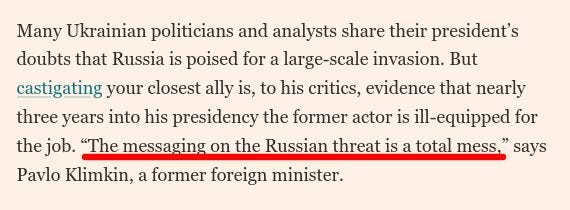Imminent and inevitable are synonyms, with a difference. An event that is “imminent” is about to happen, occur or take place very soon, especially an event (like a blitzkrieg) which won’t last long. An “inevitable” event is something that’s impossible to avoid or prevent.
Note to top Ukrainian officials: Google Translate does not pick up on this ambiguity, and neither have you.
In the old parable about a group of blind men trying to describe an elephant, each man can only feel a specific part of the animal, and so their descriptions of it are accurate, but still fail to capture the reality. Ukrainian President Volodymyr Zelensky’s 80-minute briefing for the foreign press in Kyiv on January 28 was not unlike that elephant.
Depending on your perspective, it was either a disaster or a catastrophe.
“I cannot be grateful to the United States of America simply for being the United States of America,” Z said.
That same evening, the fourth American cargo plane with lethal military supplies landed on the runway in Kyiv. At least four more deliveries worth tens and tens of millions of U.S. taxpayer dollars arrived this week.
Mykhailo Podoliak, an advisor to the head of the President’s Office, thinks the president’s messaging has been brilliant.
"The political and media discussion around the threat of a new escalation in Eastern Europe is finally getting rid of excessive emotions. We see that even White House Spokeswoman Psaki said it was a mistake to use the word "inevitably" ["неминуче"] in relation to the threat of escalation. This is an important diplomatic result, thanks to the activity of President Zelensky," he said on February 3 in an interview with Interfax-Ukraine.
Not so fast, Mykhailo. Psaki said she would stop using the word “imminent” (not “inevitable” or “inevitably”) to describe Russia’s possible further invasion of Ukraine.
To make a long story short, Zelensky, Podoliak and Google Translate misunderstood the meaning the words “imminent” or “inevitable” trigger.
Psaki did not.
I thought we covered this story a week ago.
The rhetorical and analytical rift between Ukraine and America, which previously warned of an “imminent” (not “inevitable”) Russian invasion of Ukraine is discussed in an article, titled “Blood Hype,” appearing in the February 5 edition of the Economist.
Like Podoliak, the author of this article confuses “imminent” with “inevitable.” The “rift” is not rhetorical or analytical. As we explained above, it’s linguistic. Words do not contain meaning, they trigger meaning. Rinse, repeat.
In other news…
@tashecon tweets:
This is shameful - I never commented on the Oschadbank [Ukrainian National Savings Bank] reform. They are making words up that I did not say.
Sure, whatever. Timothy Ash – typically unable to establish any sort of authoritative voice before flinging together a few thoughts of comfort to the greedy and the stupid – takes the lead in the steeplechase of hacks making hay out of what might be serious to some and/or catastrophic for others.
Still shaken from his association with the inept Former Minister of Economic Development and Trade of Ukraine Timofiy Milovanov, our battle-weary economic strategist, doing his usual shabby Nouriel Roubini impersonation, has been whining non-stop for months on Substack about Russia’s imminent military invasion, sending all the wrong signals to international financial institutions. And now he’s complaining about being misquoted.
Numerous attempts to contact Ash directly and record his thoughts on the record have, so far, been unsuccessful. Looking on the positive side, they have been appreciated by Twitter.
I once read that many white male Ukraine experts suffer from something called ‘imposter syndrome,’ a perpetual fear that someone will find out they don’t know what they’re talking about. Busted, Timothy. Now go get a real job.









